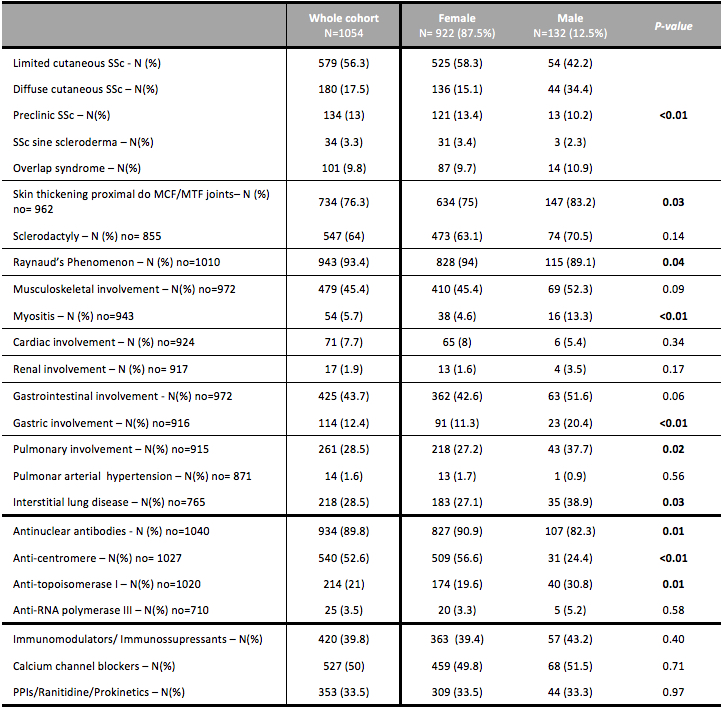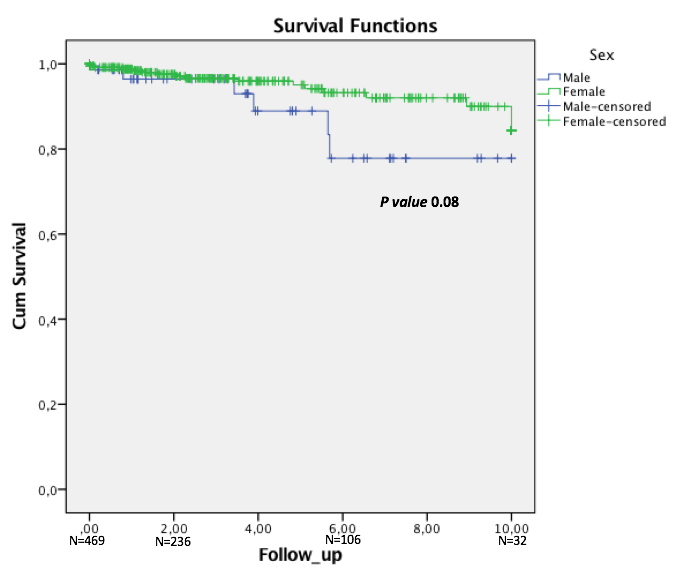Session Information
Date: Saturday, November 6, 2021
Title: Systemic Sclerosis & Related Disorders – Clinical Poster I (0387–0413)
Session Type: Poster Session A
Session Time: 8:30AM-10:30AM
Background/Purpose: Systemic sclerosis (SSc) is a rare connective tissue disease of unknown etiology, with a broad spectrum of clinical and laboratory features. Evidence for the role of sex in the clinical manifestations of SSc patients is emerging. Some multicenter cohorts have shown that male SSc patients have more severe disease [Freire M, et al. Clin Exp Rheumatol 2017; Peoples C, et al. J Scleroderma Relat Disord 2016].
Our objective was to assess the clinical manifestations and survival in the cohort of Portuguese SSc patients according to gender.
Methods: Data from adult SSc patients included in Reuma.pt database was analyzed. Demographic features, SSc subsets, main clinical and immunological features, treatments used and survival data were evaluated and compared between genders. Survival was calculated for patients included in Reuma.pt within the first two years of diagnosis. Of the 1054 patients included, 716 (68%) fulfilled ACR/EULAR 2013 criteria.
Results: In total, 1054 adult patients with SSc were included, 132 (12.5%) males. No differences in demographic features and comorbidities were found between women and men, except for a higher rate of smokers among men (64.5% vs 19.2%; p< 0.01). Diffuse cutaneous SSc subtype and anti-topoisomerase antibodies were more prevalent in males (Table 1). Raynaud’s phenomenon (RP) and skin thickening were the most frequently observed clinical manifestations, RP being more prevalent in females (84.1% vs 94%, p=0.04) and skin thickening proximal to metacarpophalangeal and metatarsophalangeal joints in males (83.2% vs 75%, p=0.03). Additionally, male patients presented significantly more myositis (13.3% vs 4.6%, p< 0.01), interstitial lung disease (38.9% vs 27.1%, p=0.03) and gastric involvement (20.4% vs 11.3%, p< 0.01). One-third of patients were treated with immunomodulators, with no differences in the pattern of drugs used between genders. During follow-up, more deaths were reported in men (12.1% vs 7.3%, p=0.04). However, the overall 1-, 3- and 5-year survival was not significantly different between men and women (96.4% vs 98.2%, 93% vs 95.9% and 83.4% vs 93.2%, p=0.08, Figure 1).
Conclusion: This study confirms the existence of gender differences in clinical and immunologic features of SSc patients. Although SSc is less common in men, they have a more severe expression of internal organ involvement. Nevertheless, no statistically significant differences were found in survival rates.
To cite this abstract in AMA style:
Freitas R, Martins P, Dourado E, Santiago T, Guimarães F, Fernandes B, Garcia S, Samões B, Pinto A, Gonçalves N, Lourenço M, Costa E, Rocha M, Couto M, Duarte A, Araújo F, Cordeiro I, Godinho F, Resende C, Salvador M, Cordeiro A, José Santos M. Gender Differences in Clinical Features and Outcomes of Systemic Sclerosis: Analysis of Reuma.pt/SSc Registry [abstract]. Arthritis Rheumatol. 2021; 73 (suppl 9). https://acrabstracts.org/abstract/gender-differences-in-clinical-features-and-outcomes-of-systemic-sclerosis-analysis-of-reuma-pt-ssc-registry/. Accessed .« Back to ACR Convergence 2021
ACR Meeting Abstracts - https://acrabstracts.org/abstract/gender-differences-in-clinical-features-and-outcomes-of-systemic-sclerosis-analysis-of-reuma-pt-ssc-registry/


